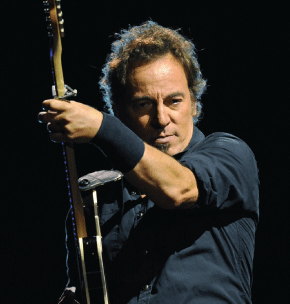 For over four decades, the New Jersey-born singer-songwriter has been delighting audiences with a hard-driving style of folk-infused rock 'n' roll.
For over four decades, the New Jersey-born singer-songwriter has been delighting audiences with a hard-driving style of folk-infused rock 'n' roll.
The Boss, as he was nicknamed early on due to his collection and distribution of his band's nightly pay, got his start playing in clubs and on college campuses, where he started to develop a cult following. But it was in the mid-1970s that he first came to prominence. After seeing him perform in 1974, music critic Jon Landau famously wrote, “I saw rock 'n' roll future, and its name is Bruce Springsteen. And on a night when I needed to feel young, he made me feel like I was hearing music for the very first time.” A legendary series of gigs at New York's famed Bottom Line in the summer of 1975 and the release of the epic Born to Run later that August solidified his reputation. Springsteen appeared on the covers of Time and Newsweek in the same week of October that year.
Springsteen's star has never really set. Moving from strength to strength, his 15 albums have sold more than 65 million copies in North America and 120 million worldwide. In the process, he has garnered 18 Grammy Awards, two Emmy Awards and an Oscar. Known for his marathon concerts lasting three hours or more, Springsteen shows no signs of slowing down. On February 1, the 59-year-old will be performing live at the SuperBowl XLIII half-time show to a worldwide audience.
Message of Hope
Over the years, Springsteen's music has matured with the man himself. The songs from his teens and early 20s are about youthful independence, love and the freedom of driving all night and running on the backstreets.
These simplistic themes evolved as Springsteen grew older, married, had children and became involved with causes such as the plight of financially distressed farmers, the poor and the marginalized. He has also become more politically aware. This past autumn, for example, he performed at a pre-election rally for then U.S. presidential candidate Barack Obama, and his interest in voter registration was instrumental in bringing this concern to the mainstream.
But throughout his career, there has always been a strand of introspection in the songs Springsteen has performed—from good-time rockers to emotionally intense ballads—as well as an underlying message of hope that, consciously or not, resonated with his fans.
Good Tidings
“A large part of Springsteen's resilience—his enduring popularity over more than three decades now—is a sense among many of us that his music points toward something deeper and somehow essential to our lives,” writes Jeffrey B. Symynkywicz in The Gospel According to Bruce Springsteen.
Symynkywicz, a graduate of Harvard Divinity School and a minister, has tracked Springsteen's musical and spiritual evolution through his albums, from Greetings From Asbury Park, N.J., through to the most recent Magic.
When Springsteen speaks of “the power, the magic, the mystery and the ministry of rock 'n' roll,” as he did during his 1999-2000 reunion tour with his E Street Band, these words were neither bluster nor bravado, Symynkywicz argues. “They were, rather, gospel truth—a clear indication of how he pictured his relationship with his fans.”
Springsteen's Catholic upbringing and his parochial school education pervades much of his music. Like so many North Americans after 9/11, Springsteen found himself bringing his family back to church. As he made peace with the faith into which he was born, many of his songs began to feature overtly religious themes. “Mary's Place can be heard as an ode to that great figure of maternal comfort and grace,” Symynkywicz writes, “and as recognition of the need we all have for a community of faith to get us through the hard times of life.”
Springsteen's defiant optimism and his invocation of concepts such as prayer, Heaven and God, are good tidings indeed and well worth listening to again and again.
“The essence of Springsteen's good news is not just that there is a power which moves through human history transcending differences, liberating that which lies captive, and healing all wounds,” concludes Symynkywicz. “His even better news is that this divine power lives and moves through indisputably common, fallible, imperfect people like us. Through the words and music of Bruce Springsteen may our ears be opened to the Spirit's song all about us, may our eyes be opened to the Spirit's gift deep within us, and may our hands and hearts be opened to do the Spirit's work here in the midst of this confusing, conflicted, mysterious, amazing world.”









Leave a Comment